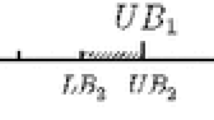Abstract
This paper is concerned with the \(1|| \sum p_j U_j\) problem, the problem of minimizing the total processing time of tardy jobs on a single machine. This is not only a fundamental scheduling problem, but also an important problem from a theoretical point of view as it generalizes the Subset Sum problem and is closely related to the 0/1-Knapsack problem. The problem is well-known to be NP-hard, but only in a weak sense, meaning it admits pseudo-polynomial time algorithms. The best known running time follows from the famous Lawler and Moore algorithm that solves a more general weighted version in \(O(P \cdot n)\) time, where P is the total processing time of all n jobs in the input. This algorithm has been developed in the late 60s, and has yet to be improved to date. In this paper we develop two new algorithms for problem, each improving on Lawler and Moore’s algorithm in a different scenario.
-
Our first algorithm runs in \({\tilde{O}}(P^{7/4})\) time, and outperforms Lawler and Moore’s algorithm in instances where \(n={\tilde{\omega }}(P^{3/4})\).
-
Our second algorithm runs in \({\tilde{O}}(\min \{P \cdot D_{\#}, P + D\})\) time, where \(D_{\#}\) is the number of different due dates in the instance, and D is the sum of all different due dates. This algorithm improves on Lawler and Moore’s algorithm when \(n={\tilde{\omega }}(D_{\#})\) or \(n={\tilde{\omega }}(D/P)\). Further, it extends the known \({\tilde{O}}(P)\) algorithm for the single due date special case of \(1||\sum p_jU_j\) in a natural way.
Both algorithms rely on basic primitive operations between sets of integers and vectors of integers for the speedup in their running times. The second algorithm relies on fast polynomial multiplication as its main engine, and can be easily extended to the case of a fixed number of machines. For the first algorithm we define a new “skewed” version of \((\max ,\min )\)-Convolution which is interesting in its own right.
Similar content being viewed by others
References
Abboud, A., Bringmann, K., Hermelin, D., Shabtay, D.: SETH-based lower bounds for subset sum and bicriteria path. In: Proceedings of of the 30th Annual ACM-SIAM Symposium on Discrete Algorithms (SODA), pp. 41–57 (2019)
Bringmann, K.: A near-linear pseudopolynomial time algorithm for subset sum. In: Proceedings of the 28th Annual ACM-SIAM Symposium on Discrete Algorithms (SODA), pp. 1073–1084 (2017)
Cormen, Thomas H., Leiserson, Charles E., Rivest, Ronald L., Stein, Clifford: Introduction to Algorithms, 3rd edn. The MIT Press, Cambridge (2009)
Cygan, Marek, Mucha, Marcin, Wegrzycki, Karol, Wlodarczyk, Michal: On problems equivalent to (min, +)-convolution. ACM Trans. Algorithms 15(1), 14:1-14:25 (2019)
Graham, Ronald L.: Bounds on multiprocessing timing anomalies. SIAM J. Appl. Math. 17(2), 416–429 (1969)
Karp, R.M.: Reducibility among combinatorial problems. In: Complexity of Computer Computations, pp. 85–103. Springer, Berlin (1972)
Koiliaris, K., Xu, C.: A faster pseudopolynomial time algorithm for subset sum. In: Proceedings of the 28th Annual ACM-SIAM Symposium on Discrete Algorithms (SODA), pp. 1062–1072 (2017)
Kosaraju, S.R.: Efficient tree pattern matching. In: Proceedings of the 30th annual symposium on Foundations Of Computer Science (FOCS), pp. 178–183 (1989)
Künnemann, M., Paturi, R., Schneider, S.: On the fine-grained complexity of one-dimensional dynamic programming. In: Proceedings of the 44th International Colloquium on Automata, Languages, and Programming (ICALP), pp. 21:1–21:15 (2017)
Lawler, Eugene L., Moore, James M.: A functional equation and its application to resource allocation and sequencing problems. Manage. Sci. 16(1), 77–84 (1969)
Pan, Victor Y.: Simple multivariate polynomial multiplication. J. Symb. Comput. 18(3), 183–186 (1994)
Author information
Authors and Affiliations
Corresponding author
Additional information
Publisher's Note
Springer Nature remains neutral with regard to jurisdictional claims in published maps and institutional affiliations.
This work is part of the project TIPEA that has received funding from the European Research Council (ERC) under the European Union’s Horizon 2020 research and innovation programme (Grant agreement No. 850979). This research was also supported by THE ISRAEL SCIENCE FOUNDATION (Grant no. 1070/20). A preliminary version of the paper appeared in the proceedings of ICALP 2020: 4:1-4:15.
Throughout the paper we use \({\tilde{O}}(\cdot )\) to suppress logarithmic factors.
Rights and permissions
About this article
Cite this article
Bringmann, K., Fischer, N., Hermelin, D. et al. Faster Minimization of Tardy Processing Time on a Single Machine. Algorithmica 84, 1341–1356 (2022). https://doi.org/10.1007/s00453-022-00928-w
Received:
Accepted:
Published:
Issue Date:
DOI: https://doi.org/10.1007/s00453-022-00928-w



